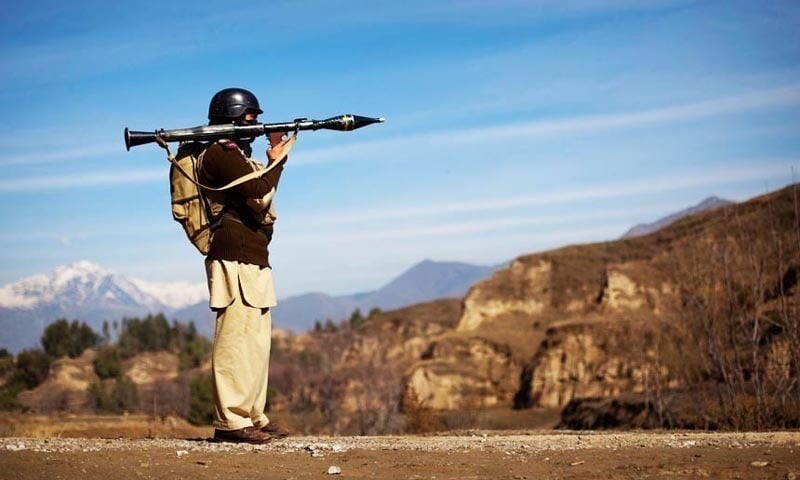
Police and bureaucracy in KP seem to be disagreeing about how to go about setting up police structure in Fata districts

The Khyber Pakhtunkhwa police is cautious about their plans of going into the tribal areas that have been merged in the province. Perhaps one of the reasons is that the police and civilian bureaucracy are not on the same page.
Police authorities in off the record meetings with this scribe, have made it clear they will not accept any what they call ‘hybrid system’ of policing in the tribal areas and that the officers posted in the district will be directly reporting to the Central Police Office (CPO) in Peshawar like other districts.
According to a document which this scribe has seen, there is another plan made by the civilian bureaucracy which suggests setting up of a central levies office in Peshawar under the Home Department that will be supervising policing in all the seven agencies, six frontier regions and Malakand.
The system will remain the same and only a few superintendents of police (SPs) will be posted in the agencies that too under the command of the political agent, or the deputy commissioner if the nomenclatures are changed.
Both police and civil bureaucrats are at loggerheads over not only policing in Fata but a number of issues, only to grab more powers for their cadres, affecting the service delivery and welfare of the people for the last many years.
This tug of war first delayed the passage and then implementation of Police Act 2017 as well as formation of the public safety commissions and a number of issues. Now it is to create hurdles in introducing regular policing in the recently merged Fata.
The KP police is enthusiastic to go to the tribal areas to perform their responsibilities. This will also increase the number of vacancies in senior and junior grades, expediting promotions within the force. The KP police nominated a focal person and constituted committees under senior officers to finalise arrangements. For unknown reasons, the entire process was kept a complete secret.
The inspector general of police, Salahuddin Mahsud, was asked by this reporter on a couple of occasions as to what their plans were about policing in the once tribal areas. The otherwise outspoken police chief remained tight-lipped about any plan. "We are always ready to meet any challenge. But I will not be able to comment until we receive directions from government in black and white," says Salahuddin Khan Mahsud, IGP KP.
"We have made our preparations to walk into the tribal areas when directed by the government," says Waqar Ahmad, director general public relations KP police.
The police bosses are either not prepared or they are afraid their statement can trigger a controversy at a time when the civilian bureaucracy is already against the proposed plan of policing in tribals areas similar to that of KP.
Currently a bureaucrat political agent of grade 18 or 19 performs the duty of the head of district administration, judge of the local court system as well as chief of the law enforcement personnel. This has made the posts of 7 Political Agents and many of their assistants and tehsildars the most lucrative across the country. They will not easily agree to share many things with police even after the merger.
The KP police constituted eight committees at the provincial level last year while another eight at the agency level to complete their homework for setting up police stations, posts and offices for introducing regular police system in these areas.
The committees set up at the agency level were to identify vulnerabilities, ascertain cultural acceptability of regular policing, identify tribal sensitivities, utility of the existing levies, ascertain training of levies and khasadars, recommending the total required strength of officers and other policemen and proposing a consolidated security plan.
The committees set up at the provincial level were to work on training, look at the problems with levies, their training, cultivating a positive public opinion, human resource, and others.
Though the bosses refused to speak, some sources have disclosed that a one-step advanced security arrangement is being proposed for the tribal areas from the very beginning to effectively introduce police in the tribal belt. The Khyber Pakhtunkhwa Home and Tribal Affairs Department as well as the KP police have held a large number of meetings in the recent months to propose a model for policing in the tribal areas.
At present, there are 11,739 sanctioned levies posts in Fata, of which 9,505 of them are filled while 2,234 positions are vacant. Besides, there are 17,965 Khasadar force personnel currently serving in Fata. The police is preparing to train these officials through army to effectively use them for policing after setting up police stations and police posts all over the tribal areas.
According to a source, there was a proposal for setting up 95 police stations with 190 police posts in the seven agencies and six frontier regions. "Out of these, 15 police stations have been proposed in North and South Waziristan each, 12 each in Khyber, Bajaur and Mohmand, six in Orakzai and five in Kurram Agency. Besides, three police stations each have been proposed in Frontier Region Peshawar, Kohat, Bannu, Lakki Marwat, Dera Ismail Khan and FR Tank," a source quoted from one of the plans.
Read also: Jirga to judiciary
More than the regular police, a much improved structure of the counter terrorism department was proposed by the KP police since the tribal areas remained worst affected of violence over the last one and a half decades.
Under the plan, three positions of senior superintendents of police (SSPs) CTD have been proposed for Northern, Central and Southern tribal areas with one SP assisting them in all the agencies. The total number of officers proposed for CTD in Fata include three SSPs, seven SPs, 51 DSPs, 121 inspectors, 176 sub inspectors, 226 assistant sub inspectors, 303 head constables and 1280 constables.